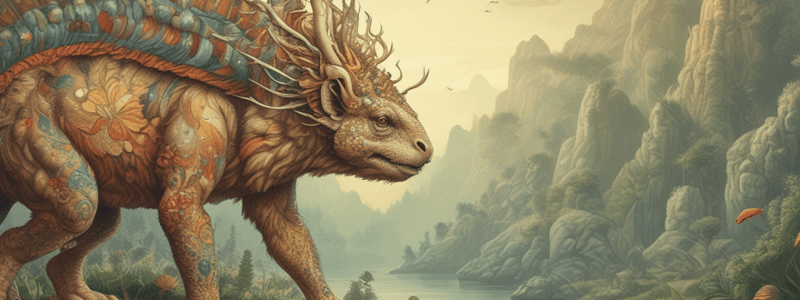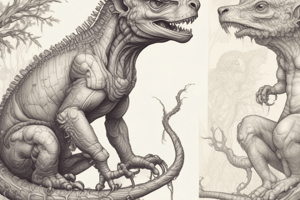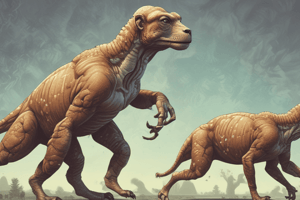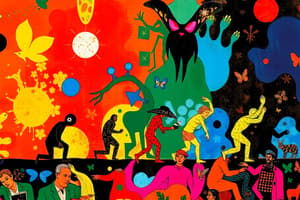Podcast
Questions and Answers
What is the smallest unit of evolution?
What is the smallest unit of evolution?
- Species
- Population (correct)
- Individual
- Community
What happened to the average beak size in the finch population after the 1977 drought?
What happened to the average beak size in the finch population after the 1977 drought?
- It remained the same
- It decreased
- It became more variable
- It increased (correct)
What is the effect of a bottleneck on genetic variation in a population?
What is the effect of a bottleneck on genetic variation in a population?
- A decrease in genetic variation (correct)
- An influx of new alleles from other populations
- An increase in genetic variation
- No change in genetic variation
What type of change in allele frequencies occurred in the finch population after the 1977 drought?
What type of change in allele frequencies occurred in the finch population after the 1977 drought?
What is the primary mechanism that drives adaptive evolution in a population?
What is the primary mechanism that drives adaptive evolution in a population?
What is the importance of genetic drift in conservation biology?
What is the importance of genetic drift in conservation biology?
What did not occur in the individual finches during the 1977 drought?
What did not occur in the individual finches during the 1977 drought?
What is the result of birds with large beaks being better able to survive and reproduce during a drought?
What is the result of birds with large beaks being better able to survive and reproduce during a drought?
What is the term for the change in allele frequencies in a population over time?
What is the term for the change in allele frequencies in a population over time?
Which mechanism of evolution can lead to a loss of allelic variation in a population?
Which mechanism of evolution can lead to a loss of allelic variation in a population?
What is the process that can introduce new alleles into a population from other populations?
What is the process that can introduce new alleles into a population from other populations?
What is the key concept that was missing from Charles Darwin's explanation of evolution?
What is the key concept that was missing from Charles Darwin's explanation of evolution?
What is the primary reason why the change in allele frequencies from one generation to the next is very small?
What is the primary reason why the change in allele frequencies from one generation to the next is very small?
What is the effect of nonrandom mating on allele frequencies in a gene pool?
What is the effect of nonrandom mating on allele frequencies in a gene pool?
What is the primary mechanism by which natural selection alters allele frequencies?
What is the primary mechanism by which natural selection alters allele frequencies?
What is the effect of genetic drift on the genetic variation of a population?
What is the effect of genetic drift on the genetic variation of a population?
What is the primary mechanism by which new alleles can enter a population?
What is the primary mechanism by which new alleles can enter a population?
What is the significance of the increased frequency of the DDT-resistance allele in Drosophila melanogaster?
What is the significance of the increased frequency of the DDT-resistance allele in Drosophila melanogaster?
Flashcards
Microevolution
Microevolution
A change in allele frequencies within a population over time.
Natural Selection
Natural Selection
A process where individuals with traits better suited to their environment have higher chances of survival and reproduction.
Mutation
Mutation
Any change in the nucleotide sequence of an organism's DNA, which can create new alleles and introduce genetic variation into a population.
Inheritance
Inheritance
Signup and view all the flashcards
Gene pool
Gene pool
Signup and view all the flashcards
Allele frequency
Allele frequency
Signup and view all the flashcards
Genetic drift
Genetic drift
Signup and view all the flashcards
Gene flow
Gene flow
Signup and view all the flashcards
Adaptive evolution
Adaptive evolution
Signup and view all the flashcards
Adaptation
Adaptation
Signup and view all the flashcards
Evolutionary change
Evolutionary change
Signup and view all the flashcards
Sexual reproduction
Sexual reproduction
Signup and view all the flashcards
Variation
Variation
Signup and view all the flashcards
Beneficial traits
Beneficial traits
Signup and view all the flashcards
Fitness
Fitness
Signup and view all the flashcards
Population genetics
Population genetics
Signup and view all the flashcards
Speciation
Speciation
Signup and view all the flashcards
Phylogeny
Phylogeny
Signup and view all the flashcards
Study Notes
The Evolution of Populations
- A common misconception about evolution is that organisms evolve during their lifetimes, but it is the population that evolves, not the individual.
- Natural selection acts on individuals, affecting their survival and reproductive success relative to others in the population.
The Medium Ground Finch Example
- In 1977, a drought on the Galápagos Islands affected the medium ground finch (Geospiza fortis) population, with only 180 out of 1200 birds surviving.
- The surviving finches had larger, deeper beaks than those that died, allowing them to crack open large, hard seeds that were abundant during the drought.
- After the drought, the average beak size in the population was larger, demonstrating evolution by natural selection.
Microevolution and Mechanisms of Change
- Microevolution is defined as a change in allele frequencies in a population over time.
- Three mechanisms can cause allele frequencies to change: natural selection, genetic drift, and gene flow.
- Natural selection is the only mechanism of adaptive evolution, improving the match between organisms and their environment.
Genetic Variation and Evolution
- Mutation and sexual reproduction produce the genetic variation that makes evolution possible.
- Charles Darwin proposed a mechanism for change in species over time, but lacked an understanding of inheritance that could explain how chance variations arise in a population.
- Gregor Mendel's particulate hypothesis of inheritance supported Darwin's theory, stating that parents pass on discrete heritable units (genes) that retain their identities in offspring.
Mechanisms of Evolutionary Change
- New mutations can modify allele frequencies, but the change is small because mutations are rare.
- Nonrandom mating can affect the frequencies of homozygous and heterozygous genotypes, but has no effect on allele frequencies in the gene pool.
- Natural selection, genetic drift, and gene flow are the three mechanisms that directly alter allele frequencies, leading to evolutionary change.
Natural Selection
- Individuals in a population vary in their heritable traits.
- Individuals with variations better suited to the environment tend to produce more offspring than those with less suitable variations.
- As a result of selection, alleles are passed on to the next generation in frequencies different from their relative frequencies in the present population.
- For example, the fruit fly Drosophila melanogaster developed an allele conferring resistance to insecticides, which increased in frequency from 0% to 37% over 20 years of DDT use.
Studying That Suits You
Use AI to generate personalized quizzes and flashcards to suit your learning preferences.




